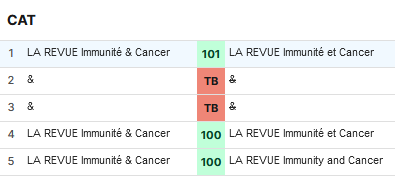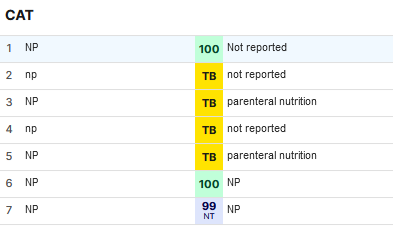TM Clean-up: A Pharma Case Study
Founded in 2002 with a commitment to moving language boundaries, PoliLingua began as a dedicated Language Services Provider. Throughout our journey, we have welcomed clients of all sizes, from large corporations to individual consultants, ensuring tailored solutions for every need.
Today, PoliLingua is a premier translation agency with a network of over 10,000 linguists and industry professionals. With expertise in over 200 languages, we specialize in delivering translation services in various fields, including legal, medical, technical, and marketing. Our services include translation, interpreting, localization, subtitling, captioning, transcription, desktop publishing, and typesetting.
Our mission is to contribute to the success of our clients' businesses by delivering high-quality, reliable language services.
.jpg)
.jpg)
Our Client
Our client is a prominent translation agency serving a leading pharmaceutical company. This pharmaceutical giant, operating across numerous markets, specializes in innovative healthcare solutions. They have engaged our services to clean their translation memory.
The final client, a leading pharmaceutical company, faced significant challenges in managing their translation memory (TM) due to the large volume of multilingual content. Over time, the TM had accumulated errors, inconsistencies, old terminology, and duplications, which affected the quality and consistency of their translations. This situation increased the time and costs required for reviewing and updating translated content. The pharmaceutical company turned to the translation agency, which then sought our expertise to clean and optimize the translation memory.
Client's Objectives
The client had to translate a large pharmaceutical research database from French to English. To achieve this, they needed to optimize their translation memory. So, the secondary objectives included:
- Correcting the existing translations.
- Merging segments to create coherent full sentences.
- Splitting segments containing multiple sentences into individual segments for clarity.
- Deleting segments that were obsolete or incomplete.
- Deleting the repetitive segments to improve consistency.
To meet the client's needs, we aimed to recruit specialized translators with expertise in French to English pharmaceutical translations, both from new talent and our existing base. We appointed a project manager and established a detailed workflow to ensure efficient operations and consistent quality. Cost management included offering bulk discounts and early payment incentives. Quality assurance involved rigorous monitoring and regular feedback sessions. We implemented strategies to handle non-sensical phrases and trained translators to manage pharmaceutical abbreviations accurately.
 (1).jpg)
Our Strategy
- Recruit Translators: To search for translators with expertise in French to English pharmaceutical translations by utilizing job boards, professional networks, and industry-specific forums. To identify qualified translators from our existing database.
- Project Management: To appoint a dedicated project manager to oversee the recruitment, onboarding, and workflow processes. Then, to develop a detailed project plan with milestones and deadlines to ensure timely completion of translation projects. Finally, to implement project management software to track progress and manage tasks efficiently.
- Resource Provision: To create and distribute a comprehensive glossary of medical terms to all translators to ensure uniformity in translations.
- Cost Management: Cost management should focus on negotiating the actual hours worked. Estimate the final cost based on these hours, e.g., reducing from 250 to 200 hours can yield substantial savings.
- Quality Control: To set up a monitoring system to rigorously review translations during the first month, conduct regular feedback sessions with translators for performance evaluation and issue resolution, and develop a quality assurance checklist to ensure all translations meet required standards before delivery.
- Consistency Assurance: To enhance quality control, implement a multi-layer review process involving peer and senior translator reviews to identify and correct non-sensical phrases. Enforce the consistent use of a prioritized glossary of terms to maintain terminology consistency across all translations, and schedule periodic audits to uphold high-quality standards throughout the project.
- Challenges Handling: Offer translators clear guidelines for managing various hurdles, including nonsensical phrases, phrases with dual translations, pharmaceutical abbreviations, and acronyms.
Work Process
The TM to be cleaned up was pretty large, with about 250k segments overall. To address the project's size, we adopted a tactic of segmenting the TM into manageable batches. This segmentation not only facilitated concurrent work by multiple linguists but also allowed for a more focused and systematic approach to cleaning the TM. Our team, comprising linguists proficient in both French and English, utilized the Olifant TM editing tool, known for its user-friendly interface and efficiency-enhancing shortcuts.
We began by segmenting the TM into manageable batches, enabling multiple linguists to work concurrently, thus expediting the process. Each linguist meticulously cleaned the TM, removing duplicates, rectifying errors, and ensuring consistency throughout. During the TM editing phase, special attention was given to segments containing nonsensical phrases or those with dual translations. Linguists relied on context and collaboration to resolve ambiguities effectively. Furthermore, a comprehensive review process was implemented to ensure accurate handling of pharmaceutical abbreviations and acronyms. It was imperative to maintain consistency, particularly in translating terms like "RX," consistently rendered as "prescription medication."
Upon completion, the cleaned TM was seamlessly integrated into our Computer Assisted Translation (CAT) Tool for future projects, thereby enhancing translation efficiency and accuracy. Despite encountering challenges such as ambiguous segments, we successfully managed them by implementing segment tagging for clarification, fostering collaborative review among linguists, and consulting subject matter experts when needed. Additionally, quality variations in some sentences were managed by implementing a robust quality assurance process, including peer review and client feedback loops.
Results
PoliLingua successfully met the client's objectives by thoroughly cleaning and optimizing their translation memory. This process enhanced the quality and usability of the translation memory, ensuring that it is now perfectly suited for the future task of translating a large pharmaceutical research database from French to English. The improved translation memory will facilitate more efficient, accurate, and consistent translations, directly supporting the client's expansion into new EU markets and enhancing their international communication.
The streamlined TM allows for quicker and more accurate translations, reducing time and effort for future projects. Clearer and more coherent translations enhance international communication, ensuring messages are accurately conveyed.
The improved TM supports the client’s ability to expand into new EU markets by providing reliable and consistent translations in multiple languages.
By eliminating redundant and obsolete segments, the TM is more efficient, potentially lowering future translation costs. Here are some examples from the work process: 

 (1).jpg)
Feedback from the client
“Dear PoliLingua Team,
We are very pleased with the results of the translation memory cleanup project. Your team successfully met our objectives in a fairly short turnaround time.
The cleaned and optimized translation memory has significantly improved the quality and usability of translation resources. Your attention to detail and commitment to quality were evident throughout the process. We appreciated your proactive approach and regular feedback, which ensured any issues were promptly addressed.
We appreciate your professional service and look forward to continuing our collaboration on other ten languages for the EU market.”
Conclusion
PoliLingua’s translation memory (TM) clean-up for a major pharmaceutical client was a highly successful project. By recruiting specialized translators and implementing detailed project management strategies, we effectively addressed the client's challenges.
The optimized TM has enhanced the quality and usability of the client’s translation resources, leading to quicker and more accurate translations. This improvement supports the client’s expansion into new EU markets by providing reliable translations and reducing future project time and costs.
Positive feedback from the client highlights our attention to detail, commitment to quality, and proactive approach. The client’s satisfaction and recognition of our professional service confirm our ability to handle complex projects and contribute to their business success. This case study underscores PoliLingua’s mission of moving language boundaries and reinforces our reputation as a premier translation agency.
.jpg)







